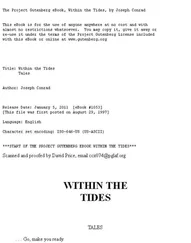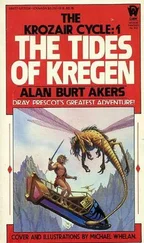Craig Saunders - Tides of Rythe
Здесь есть возможность читать онлайн «Craig Saunders - Tides of Rythe» весь текст электронной книги совершенно бесплатно (целиком полную версию без сокращений). В некоторых случаях можно слушать аудио, скачать через торрент в формате fb2 и присутствует краткое содержание. Жанр: Фэнтези, на английском языке. Описание произведения, (предисловие) а так же отзывы посетителей доступны на портале библиотеки ЛибКат.
- Название:Tides of Rythe
- Автор:
- Жанр:
- Год:неизвестен
- ISBN:нет данных
- Рейтинг книги:3 / 5. Голосов: 1
-
Избранное:Добавить в избранное
- Отзывы:
-
Ваша оценка:
- 60
- 1
- 2
- 3
- 4
- 5
Tides of Rythe: краткое содержание, описание и аннотация
Предлагаем к чтению аннотацию, описание, краткое содержание или предисловие (зависит от того, что написал сам автор книги «Tides of Rythe»). Если вы не нашли необходимую информацию о книге — напишите в комментариях, мы постараемся отыскать её.
Tides of Rythe — читать онлайн бесплатно полную книгу (весь текст) целиком
Ниже представлен текст книги, разбитый по страницам. Система сохранения места последней прочитанной страницы, позволяет с удобством читать онлайн бесплатно книгу «Tides of Rythe», без необходимости каждый раз заново искать на чём Вы остановились. Поставьте закладку, и сможете в любой момент перейти на страницу, на которой закончили чтение.
Интервал:
Закладка:
They toyed with the air, as if dissatisfied with the sea alone. They burst from the seas, twisting playfully in the air. Seamirs, he thought to himself. It seemed more appropriate.
They gave him comfort, as he watched their dance around the ship. A good thing, he thought, since he had seen the shadow under the water, as long as one of the seafarer’s boats, moving lazily like it was hunting, just an elongated shape under the water. He did not want to see more. He was not so curious as that. A beast that size could capsize a boat. He thought of his little fishing boat back at the village, rotting slowly. A fish that size could eat his boat, he had thought with a shudder. A leviathan, perhaps, out of fishermen’s stories, that ate the boats that strayed too far from shore, jealous that men could sail on the waves it wanted for its own. The leviathans were ever hungry, said the old fishermen, and hated men for taking their food. Go too far out, they said, and the beast will take you out of spite, and teach you a lesson. The bigger your boat, the tastier you will be.
If it was a leviathan, what the old fishermen said was surely true. But even the greatest fish in all the sea would not be able to swallow this ship, this Diandom. He had felt fear, but it had passed on, and the Seamirs had come in the giant beast’s wake, guiding the ship ever north.
They had been assured that it was moving steadily north. There was no tell-tale motion, though. The seas did not speed past. The ship had no prow to speak of. It was circular, but the north side of the ship always pointed north; exactly like an island. Renir could only tell by the motion of the suns, and the stars at night. Carious always set in the west, and Dow a little way north of him. The ship might seem motionless, as steady as a rock, but it was moving on, of that he was sure.
It was such a strange vessel, so much like land but for the absence of dirt, and so far beyond any experience Bourninund or Renir had ever had.
There were fresh water ponds, full of rainwater. Fronds grew from the depths, spreading their leaves on the surface to drink in the sunlight. Flowers in the trees, fungus and fruit growing where it should be impossible. People fishing from their boats, or with spears and nets from the edge of the ship, where it lay low in the water like a natural bay. The swimmers did not seem bothered by the leviathan. Perhaps they were too small for its mountainous teeth. There was no way Renir would swim in this sea, this sea that was new to him, full of wonder and perils that lived in the deeps.
Some of the fishes that were brought in with the catch were marvellous, brightly coloured or strangely shaped. Some of the catch could never be called a fish. There were things that looked like cucumbers, and tentacled things, some with beaks and eyes, some translucent, or even shifting in colour to match the hand that held it, or the wood on which it lay. Renir did not try eating one of those, but everything else he sampled with his evening meal. Most he kept down, but once or twice he had hurled, green faced, in lee of the gentle wind and over the side of the ship, returning the catch to the sea. The seafarers laughed, which was fortunate, for if they had taken offence he was not sure he could have changed anything.
Since being freed he had roamed the decks, storing away the memory. Shorn assured them that all too soon they would see land again, although Renir was not reassured. The sea could not even be seen from the centre of the ship. A man could spend his life on the ship and never see the sea, or even land should they reach their goal. And that, too, was in doubt. While he and Bourninund roamed, Shorn, Wen and Drun were in deep discussion with the seafarer council.
Renir smarted from his exclusion, but as Bourninund said, plain men had little to offer council, and he, at least, knew his place. Renir followed his example, and instead made the most of this peaceful time between fights. It was something else Bourninund had taught him. A warrior’s life was largely made up of waiting. He resolved to be good at that if nothing else.
Toward the centre of the ship was the hub, where most of the activity took place, and it was there that Renir had spent much of the afternoon, taking his lunch gratefully. There were tradesmen and women, although their wares were bought not with currency but by barter, and sometimes need. There was no wasted effort. As everywhere, people needed time to rest, children needed time to play. There were plays, where storytellers dressed in costumes and told stories, playing different parts after changing their outfits. It seemed a strange pastime, but Bourninund and Renir enjoyed a weekly performance. In the play, there was an evil king, and his unfaithful wife. Both were landfarers, the wife’s paramour a seafarer. He was, of course, the hero. Renir thought the blood real when the king killed the hero, but Shorn assured him it was dye. All the same, Renir found he was relieved when the players returned to take their applause. The seafarers showed their appreciation by slapping the boards on which they sat.
Many times in their wanderings Renir and Bourninund could have been in trouble. Most of the seafarers accepted that they were now guests, but on occasion they were barged in passing, or heard mutters under their breath. Renir had to stop Bourninund from thumping more than one rude youngster. Things could all too easily escalate, now that their weapons had been returned. He had no intention of spending any more time as a captive.
How proud I have become, he mused. No longer afraid of death, just captivity. Perhaps soon nothing will hold fear for him. But he had not met the Protectorate, yet. Was it a mighty army, would it suffice for his skills? He flexed his bicep at Bourninund and roared (quietly). The bear merely looked bemused and returned his gaze to the setting suns.
Renir didn’t think he would ever scare the bear, grizzled and scarred, hard as teak. He grinned sheepishly at Bourninund, who smiled in acknowledgement, and returned to his waiting. He was getting good at it.
There were other things that Renir found strange. In all his meanderings, he found no old ones. He was accustomed to village life, and Turnmarket on ocassion. Since his sheltered youth he had travelled the length of Sturma, and seen many old people. People lived longer than they used to, back when war was a common occurrence. But he saw few with grey hairs, and fewer wrinkles. It was as though they had found the secret of youth — but Renir knew different, now.
They sent their old and infirm away into the sea. They were given rafts, but no food. They called it ‘going over the horizon’ but it was culling, pure and simple. Those that could no longer work, or were feeble, or had the bone rot — all went into the sea. It was no surprise that none were seen again. The seafarers thought the old ones found ‘the peaceful land’, where they could rest their feet on dirt, and build their homes.
It seemed overly harsh to Renir. He was sure none of the rafts ever found land, just as he was sure the seafarers didn’t truly think that this was the case. But he said nothing, holding his tongue. It wasn’t for him to try to change the people. They had enough strange ways that he could spend a lifetime at it.
Once, when he had first started out on his journey, he had thought everything strange and sometimes stupid. People everywhere believed differently, their gods had unusual names that he didn’t know. But, he knew now that his gods were as strange to them as theirs were to him.
It was no wonder Wen, and Bourninund and Drun were stared at so openly. The probably though they were old ones, returned from the peaceful land. Just so long as they didn’t try to put them on a raft, he supposed it did not truly matter. Wen and Drun knew about it already — there seemed little Drun did not know — but Bourninund had taken to snarling at people who stared at him.
Читать дальшеИнтервал:
Закладка:
Похожие книги на «Tides of Rythe»
Представляем Вашему вниманию похожие книги на «Tides of Rythe» списком для выбора. Мы отобрали схожую по названию и смыслу литературу в надежде предоставить читателям больше вариантов отыскать новые, интересные, ещё непрочитанные произведения.
Обсуждение, отзывы о книге «Tides of Rythe» и просто собственные мнения читателей. Оставьте ваши комментарии, напишите, что Вы думаете о произведении, его смысле или главных героях. Укажите что конкретно понравилось, а что нет, и почему Вы так считаете.












